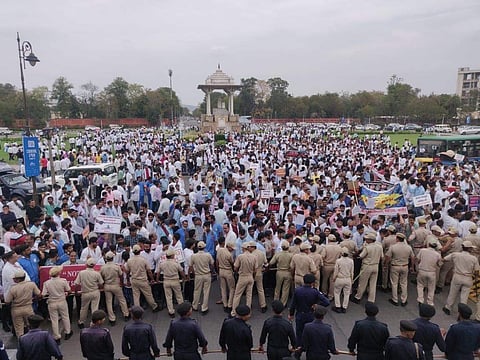

"It was highly unprecedented and the most brutal attack on doctors I have seen in my 30-year career," says Dr Raj Shekhar Yadav, State Convenor of the United Private Clinics and Hospitals Association of Rajasthan (UPCHAR), on the lathi-charge incident in Jaipur on March 20. Doctors, including residents and medical college professors, were on protest against the Right to Health (RTH) Bill.
Dr Yadav mentions that the Bill was introduced in the State Assembly in September last year, but had met with severe opposition. A Select Committee was then appointed to look into it. "The Committee conducted a meeting with us, among other concerned people, and gave its report about a month ago. The Bill is set to be tabled in the Assembly once more today (March 21)," he says.
The Bill seeks to provide residents of Rajasthan the right to avail of free emergency healthcare services from hospitals, clinics and laboratories, including private establishments. Speaking about the problems with it, Dr Yadav, says, "The Bill is unnecessary. Healthcare in Rajasthan is already over-regulated."
He mentions that 54 Acts govern the healthcare infrastructure in the state. "More regulations will only affect the quality of treatment. The Bill is a political eyewash. It does not introduce any new provisions, or bring any changes. The old schemes are modified in it," the State Convenor of UPCHAR adds.
He further says that as far as free healthcare facilities were concerned, the Rajasthan government already has a set of related schemes running. "The Bill seeks to just hold more control over the government, and especially private, sectors, which is unnecessary and threatens the quality of treatment," he tells.
"The need of the hour is to cut loose on the regulations so that the hospitals can function with ease. The government should focus on improving infrastructure and manpower in its hospitals, and leave the private sector alone," the doctor adds.
Students do not favour the Bill either. Ankit Roat, who pursues MBBS from the Government Medical College, Jhalawar, is worried that its implementation would deprive them of the opportunity to learn. "As government college students, we learn the practice at emergency wards. But if the Bill comes into force, people will prefer private clinics and the footfall in government emergency wards will decrease. Then where will we go to learn?" he questions.
He also points out that the students are taught medical ethics, which will be difficult to put into practice if people demand unnecessary provisions in the name of the Bill. "We will be at risk of being misbehaved with during work," Ankit says. The student further mentions that if their professors are stressed or face problems due to the Bill, it will indirectly affect their education.
Speaking about what is wrong with the Bill from his point of view, the student says, "If all the private hospitals are forced to impart free services, the small establishments, with 15-30 beds, will not be able to survive. Another grave problem we will all face as doctors are dealing with patients. If emergency services are free, even those who have minor ailments will demand admission to emergency wards. This might deprive patients who genuinely need emergency care of proper treatment."
Strike on March 20
More than 2,400 doctors, mostly from private medical colleges, took to the streets in Jaipur to protest against the said Bill. They planned to march to the Vidhan Sabha but were stopped by the police. The doctors then sat on a dharna on the road, and the situation soon turned violent as the protestors began removing police barricades, as mentioned in a report by The New Indian Express.
"The police were very harsh. Even the women doctors suffered in the violence," Dr Yadav stated. Today, organisations like the Indian Medical Association (IMA), Federation of Resident Doctors' Association (FORDA) and Federation of All India Medical Association (FAIMA) have shown solidarity with the protesting doctors and condemned the attack. IMA and FORDA have written letters to Chief Minister Ashok Gehlot, urging him to take note of the incident and act accordingly.
